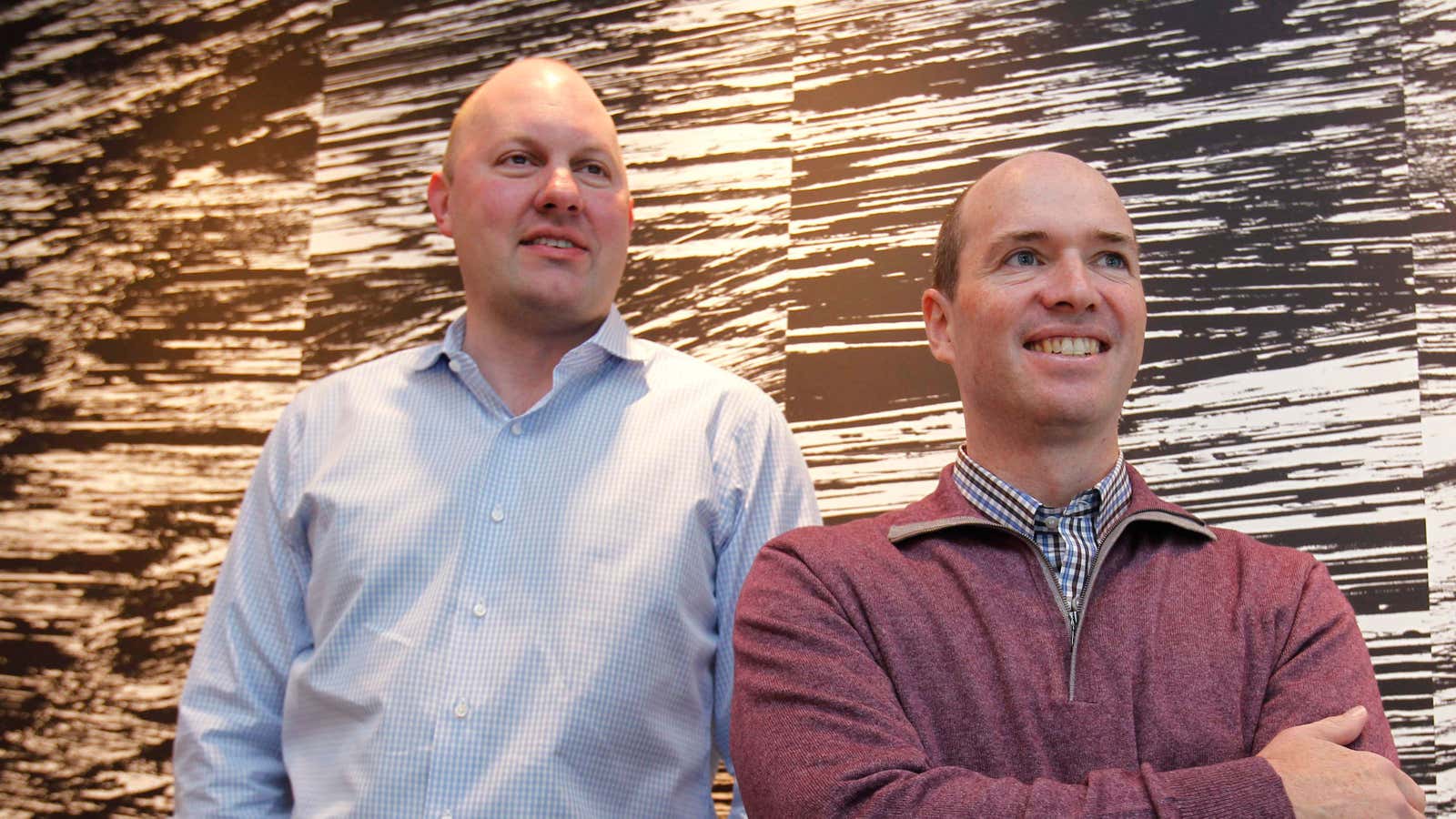It’s hard to predict what startups Andreessen Horowitz wants to get behind. The venture capital firm—arguably one of the most influential in the tech industry—invests in about 1 out of every 100 deals that come its way, making decisions not based on particular themes or topics, but rather people and ideas. That’s fine and dandy, but it’s not much to work off of for entrepreneurs, all of whom are inclined to believe they’re on the cusp of the next big thing, when they’re raising money.
Pulling back the curtain a bit, partners at Andreessen Horowitz recently revealed 16 trends they’re closely watching. The list is likely to change with time, but it at least provides a snapshot of the firm’s thinking at the start of 2015.
1. Virtual reality
Chris Dixon: “The next few decades of VR will be similar to the first few decades of film. Filmmakers had no idea what worked and what didn’t: how to write, how to shoot, how to edit, etc. After decades of experiments they established the grammar of film. We’re about to enter a similar period of exploration with VR.”
2. “Sensorification” of the enterprise
Scott Weiss: “For enterprise, the value of the sensors is in being a shortcut for the user interface, potentially even replacing typing so we can concentrate on the easy, fun, creative things.”
3. Machine learning and big data
Peter Levine: “Even though the early applications tend to show up in industries where data scientists have typically worked, machine learning as a property of all applications—especially when coupled with an accessible user interface—is democratizing who, what, and where this kind of real-time computing and learning can happen … and what great new companies can be built on top of it.”
4. The full-stack startup
Dixon: “[F]or end users, full-stack startups deliver a much better experience, because they have complete control. It’s the difference between buying a beautiful, pristine Apple product versus a crappy Frankenstein PC cobbled together from dozens of vendors.”
5. Containers
Levine: “Containers are another way of isolating an application from the underlying hardware. They’re objects that serve the same purpose as a virtual machine—instantiations or clones of the host operating system with a self-standing, self-executing application inside—but they also provide bare-metal performance, because there’s no virtualization layer between.”
6. Digital Health
Balaji Srinivasan: “Today you’d accept without hesitation that the kid in the garage without a degree could write an email front-end that analyzed your email, told you the best time of day to reply, or did something else interesting, unexpected, and useful with your email data. Tomorrow? To understand your personal diagnostic data, you might soon depend more upon an iPhone app developed in a garage than on your local MD.”
7. Online marketplaces
Jeff Jordan: “We’re continuing to see tremendous innovation in marketplaces. The first generation of net companies saw a few big horizontal marketplace winners like eBay and Craigslist. But entrepreneurs are continuing to create the next generation of online marketplaces.”
8. Security
Weiss: “[A]s the threat environment moves away from individual PCs and private data centers to the cloud and mobile—as the computing platform shifts—a new set of companies are emerging. And when there’s a platform shift, there’s potential for new franchises to emerge.”
9. Bitcoin
Srinivasan: “Crash or no crash, we should expect a significant increase in the level of institutional adoption this year. Specifically, a large number of companies will put together groups focused on what Bitcoin means to them—and as early as next year we’ll start to hear people ask ‘What’s your Bitcoin strategy?’ in much the same way people asked ‘What’s your social media strategy?'”
10. Cloud-client computing
Levine: “We have more processing power in our hands today through smartphones than we did in large computers decades ago. So why shouldn’t some of this processing move out of the cloud and back into the endpoint, into the phone?”
11. Crowdfunding
Jeff Jordan: “With smartphones in our pockets, we not only have access to crowdfunding platforms whenever we want, but to the crowd that comprises the various social circles of our lives—from family to school, work, and the region we live in.”
12. Internet of Things
Weiss: “Something often overlooked when we talk about all the shiny new connected gadgets emerging out of the ‘Internet of Things’ is what happens to all the old things. I’m fascinated by the power of adding multiple sensors to old things and then connecting them to the internet.”
13. Online video
Jordan: “There will be new business models for video beyond traditional advertising. The reality is that without the scale of a YouTube or Facebook, platforms will have to find more creative ways to make money, whether it’s through subscriptions, micropayments, exclusive previews, community benefits, or other methods.”
14. Insurance
Frank Chen: “Insurance is all about distributing risk. With dramatic advances in software and data, shouldn’t the way we buy and experience our insurance products change dramatically? Software will rewrite the entire way we buy and experience our insurance products—medical, home, auto, and life.”
15. DevOps
Weiss: “DevOps [a term derived from development and operations] is more than just a methodology. It’s a must-have skill set for the modern programmer—and is increasingly becoming its own department as well (the subject of much debate).”
16. Failure
Adapted from a tweet from Marc Andreessen: “The goal is not to fail fast. The goal is to succeed over the long run. They are not the same thing.”
